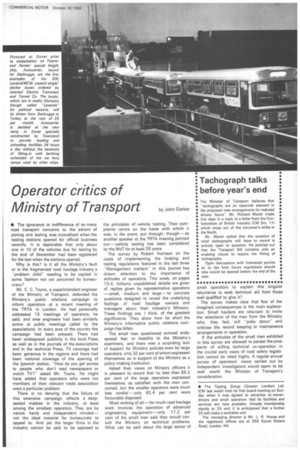Operator critics of Ministry of Transport
Page 29

If you've noticed an error in this article please click here to report it so we can fix it.
by John Darker • The ignorance or indifference of so many road transport concerns to the advent of plating and testing was crystallized when the testing stations opened for official business recently. It is deplorable that only about one in 10 of the vehicles due for testing by the end of November had been registered for the test when the stations opened.
Why is this? Is it all the Ministry's fault or is the fragmented road haulage industry a "problem child" needing to be cajoled in some fashion not yet perceived by bureaucracy?
Mr. C. C. Toyne, a superintendent engineer of the Ministry of Transport, defended the Ministry's public relations campaign to inform operators at a recent meeting of the TRTA in London. He had personally addressed 15 meetings of operators, he said, and area engineers had been similarly active at public meetings called by the associations. In every area of the country the campaign had been pressed. There had been widespread publicity in the local Press as well as in the journals of the associations and in the technical Press. TV coverage had been generous in the regions and there had been national coverage of the opening of the Ipswich station. "How do you get across to people who don't read newspapers or watch TV?" asked Mr. Toyne. He might have added that operators who were not members of their relevant trade association were a particular problem.
There is no denying that the failure of this extensive campaign reflects a deepseated malaise in the industry, at least among the smallest operators. They are by nature hardy and independent minded— not the ideal material for bureaucrats to appeal to. And yet the larger firms in the industry cannot be said to be opposed to the principles of vehicle testing. Their complaints centre on the haste with which it was, in the event, put through ; though —as another speaker at the TRTA meeting pointed out—vehicle testing has been considered by the MoT for at least 35 years.
The survey by Robert Harrison on the costs of implementing the braking and testing regulations featured in the last three "Management matters" in this journal has drawn attention to the importance of attitudes of operators. This week, on pages 73-4, hitherto unpublished details are given of replies given by representative operators —small, medium and large to concrete questions designed to reveal the underlying feelings of road haulage owners and managers about their industry's Ministry. These findings are, I think, of the greatest significance. They show how far short the Ministry's informative public relations campaign has fallen.
The small men questioned evinced widespread fear or hostility to the Ministry's examiners, and there was a surprising lack of support for Ministry policies even by large operators. only 32 per cent of whom expressed themselves as in support of the Ministry as a policy-making institution.
Asked their views on Ministry officers it is pleasant to record that no less than 95.2 per cent of the large operators expressed themselves as satisfied with the men concerned, but the smaller operators were much less cordial — only 62.4 per cent were favourably disposed.
Most striking of all—for much road haulage work involves the operation of advanced engineering equipment—only 17.2 per cent of the small men said they would consult the Ministry on technical problems. What can be said about the large sector of small operators to explain this singular reluctance to seek technical aid from those well qualified to give it?
The survey makes clear that fear of the imagined consequences is the main explanation. Small hauliers are reluctant to invite the attentions of the men from the Ministry who, they feel. will -poke about" and criticise the record keeping or maintenance arrangements in operation.
If the attitudes of the small men exhibited in this survey are allowed to persist the prospects of willing technical co-operation in the crucial early years of road safety legislation cannot be rated highly. A regular annual survey of operators' views carried out by independent investigators would seem to be well worth the Minister of Transport's consideration.
























































































































